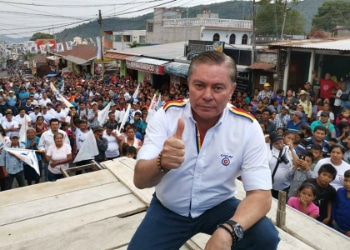The guilty plea of Mario Estrada, a former Guatemalan presidential candidate, to conspiring to import cocaine into the United States has triggered a backlash against President Jimmy Morales, who is now facing a new investigation into his ties to Estrada.
Estrada, who made an unsuccessful bid for the presidency in 2006, was captured in Miami in April 2019 but pled not guilty to conspiring to import cocaine into the United States, as well as a related weapons charge and to possess and use machine guns.
On October 8, after hearing the evidence against him, the Guatemalan politician changed his plea to guilty. Last January, he and an associate, Juan Pablo González Mayorga, met with people they believed to be members of the Sinaloa Cartel but who were actually undercover Drug Enforcement Administration (DEA) informants.
In a series of meetings, Estrada and González asked the alleged drug traffickers for $10-$12 million to finance another presidential run by Estrada. In return, they offered the Sinaloa Cartel free transportation of cocaine through Guatemala, unrestricted access to the country’s ports and airports, and to appoint a minister of the interior and other public officials who would collaborate with the cartel, according to US prosecutors.
SEE ALSO: Guatemala Presidential Candidate Solicited Sinaloa Cartel for Campaign Cash: US
According to Voice of America which had access to Estrada’s plea deal, the two suspects are collaborating in order to reduce their prison sentences to just 5 years, as well as paying a fine of $5 million. Estrada will be sentenced in January 2020.
This admission of guilt now casts a large shadow over Guatemala’s President Jimmy Morales and Interior Minister Enrique Degenhart. On October 23, the Guatemala Attorney General’s Office launched a new investigation into ties between Morales and Estrada.
InSight Crime Analysis
Central American politics have been in turmoil over the last week, as the Estrada guilty plea came on the heels of Tony Hernández, brother of Honduras President Juan Orlando Hernández, being found guilty of trafficking in New York. But while Estrada’s trial has to date not made any direct reference to President Morales, links between the two men surfaced not long after Estrada’s capture in Miami.
Morales has admitted that he met with Estrada in early April, two weeks before his capture in Miami. The president first dismissed the meeting as just being a friendly lunch but he later revealed he had met Estrada three times.
SEE ALSO: US Drug Probe Lands Guatemala President in Hot Water
Morales, in addition, had used a helicopter owned by Estrada in January 2018 to open a new police headquarters in San Marcos, Guatemala. He first claimed that the helicopter had been chartered by a third-party company but this was flatly denied by the operator, Maya World Tours. The president and his team have denied having had any knowledge at the time that Estrada had links to drug trafficking.
Estrada’s new guilty verdict has led prosecutors to take renewed interest in these events.
But the links also involve another key member of Morales’ cabinet. Enrique Degenhart, the current Interior Minister, has tried to defend Morales’ links to Estrada. But his brother, Ernesto Degenhart, was a member of the National Change Union (Unión del Cambio Nacionalista — UCN), the political party for which Estrada has served as secretary-general.
A one-time candidate for deputy for the UCN, Ernesto Degenhart is now facing his own investigation for money laundering. Additionally, on October 15, it was revealed that two employees from the Attorney General’s Office had tried to extort Degenhart. A court audience heard that the two employees told Degenhart they would avoid issuing an arrest warrant against him in exchange for 85,000 quetzales (around $11,000).
As in the Tony Hernández case, the possible relationship between Morales and a convicted drug dealer in the United States reopens the question about how Washington views its relations with governments in Central America.
In Honduras, the Trump administration’s support has been vital for President Juan Orlando Hernandez, first during his controversial re-election campaign in 2018 and now during his brother’s conviction in New York. On October 19, a day after the verdict was read, US Chargé d’Affaires in Honduras Colleen Hoey was photographed accompanying President Hernández at a military parade. “The United States is one of the president’s main supporters here,” a diplomat who asked to remain anonymous because they were not authorized to speak publicly on the matter, told InSight Crime.
Morales has been able to find similar US support for his agenda. His crusade to remove the the International Commission Against Impunity in Guatemala (Comisión Internacional Contra la Impunidad en Guatemala – CICIG), which was investigating him for potential illegal campaign financing, was aided by Republican Senator Marco Rubio of Florida.
In May 2018, Rubio put a hold on $6 million in funding for the commission following unfounded accusations that the judicial body had unfairly targeted a Russian family in exile in Guatemala for obtaining false documentation from a criminal network.

